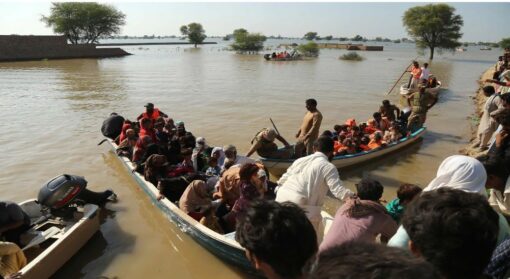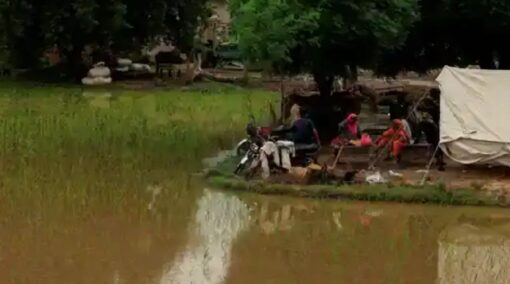Pakistan is reeling from catastrophic floods that have displaced millions, destroyed homes, and devastated farmland, and now health experts warn that the country faces an even more insidious threat: a potential cholera outbreak.
As standing water spreads across vast stretches of land, combined with limited access to clean drinking water, fears of waterborne disease are mounting. Officials say the Pakistan floods cholera crisis could spiral if urgent action is not taken.
The floods, triggered by weeks of relentless monsoon rains, have submerged entire villages and cut off communities from aid. The National Disaster Management Authority (NDMA) estimates that more than six million people have been displaced, with many living in makeshift shelters or under open skies. In these cramped and unsanitary conditions, the risk of cholera and other infectious diseases is skyrocketing.
“Cholera thrives where there is dirty water and poor sanitation, and sadly that describes many of the flood-hit regions right now,” said Dr. Ayesha Khan, a physician working with Médecins Sans Frontières in Sindh province. “We are already seeing hundreds of suspected cases of diarrhea and other waterborne illnesses. If cholera takes hold, it will spread rapidly.”

Local health departments have begun reporting clusters of suspected cholera cases in Sindh and Balochistan, the two provinces most heavily affected by the floods. Hospitals, already overwhelmed by trauma patients and malnutrition cases, are now struggling to cope with the influx.
At Karachi’s Civil Hospital, doctors said they had admitted dozens of patients showing severe symptoms of cholera, including dehydration and vomiting. “We are running short of IV fluids and oral rehydration salts,” one doctor said. “If more patients come in, our supplies could run out within days.”
Officials from Pakistan’s Ministry of Health confirmed that emergency medical teams have been dispatched, but acknowledged the scale of the crisis. “Our biggest challenge is access,” said a ministry spokesperson. “Many flood-hit areas are unreachable by road. Helicopters are dropping supplies, but it’s not enough.”
Aid agencies warn that children are particularly vulnerable in the unfolding Pakistan floods cholera emergency. With clean drinking water scarce, many families are resorting to using contaminated floodwater for cooking and washing. UNICEF has expressed grave concern over rising malnutrition and disease among displaced children.
“Children under five are most at risk of dying from cholera because they become dehydrated very quickly,” said Abdullah Fadil, UNICEF’s Pakistan representative. “This is a race against time to provide safe water and hygiene support before we see a full-blown health disaster.”
Parents in flood-affected regions describe their desperation. “My two-year-old daughter has been sick with diarrhea for three days,” said Ahmed Ali, a farmer sheltering outside Sukkur. “We have no doctor nearby. We just give her whatever medicine we can find. We are afraid she will not survive.”
The international community has pledged support, with the World Health Organization (WHO) rushing cholera kits and emergency medical supplies to Pakistan. WHO Director-General Tedros Adhanom Ghebreyesus warned that the floods had created “the perfect storm for disease outbreaks,” including malaria, dengue, and cholera.
But aid groups caution that resources are limited and needs are growing. “The scale of destruction is staggering,” said Huma Yusuf, a coordinator with the International Rescue Committee.
“Entire districts are underwater, crops are destroyed, and health facilities are overwhelmed. The risk of a large-scale cholera outbreak cannot be underestimated.”
Meanwhile, volunteers are distributing chlorine tablets, water filters, and hygiene kits to displaced families. Yet logistical hurdles persist, with washed-out roads, fuel shortages, and damaged communication lines hampering relief efforts.
Public health experts argue that the Pakistan floods cholera threat reflects deeper structural vulnerabilities. Pakistan has long struggled with inadequate sanitation infrastructure and poor water management. The floods have only magnified these systemic problems, leaving millions exposed to preventable diseases.
“This disaster is not just about rainfall—it is about governance, planning, and resilience,” said Dr. Saeed Iqbal, a professor of public health at Aga Khan University. “We cannot keep responding to emergencies without addressing the root causes. Cholera will continue to return unless clean water and sanitation are prioritized.”
Climate change is also exacerbating Pakistan’s vulnerability. Scientists note that warmer temperatures and shifting monsoon patterns are fueling heavier rainfall, making extreme floods more likely.
Last year’s devastating floods, which killed more than 1,700 people, were described as the worst in Pakistan’s history. Now, experts fear such disasters may become regular occurrences.
For families in the flood zone, the threat of cholera adds another layer of fear to an already dire situation. Survivors speak of losing everything—homes, livestock, and livelihoods—only to face sickness and hunger in the aftermath.
In Jacobabad, a city known for record-breaking heat, survivors now contend with stagnant floodwater teeming with mosquitoes and bacteria. “First we lost our house, then our crops. Now we fear losing our children to disease,” said Fatima Bibi, who is sheltering in a crowded tent with 12 relatives.

Local NGOs are working tirelessly to distribute food and medical supplies, but the need far outstrips the available resources. Many families walk for hours to reach relief camps, only to find long queues and limited assistance.
Authorities insist they are scaling up response efforts, but time is running out. The Pakistan Army has deployed thousands of personnel for rescue and relief operations, while the government has appealed for more international aid. Yet with floodwaters expected to linger for weeks, the risk of disease spreading remains dangerously high.
“The next two weeks are critical,” warned Dr. Ayesha Khan. “If we fail to contain cholera now, the consequences will be catastrophic.”
As the world watches, the Pakistan floods cholera crisis serves as a stark reminder of how climate-fueled disasters can trigger cascading humanitarian emergencies. For the millions displaced, survival depends not only on escaping the floodwaters but on finding clean water to drink, safe food to eat, and medical care in time.
For now, the fear of cholera looms large, threatening to turn an already devastating disaster into an even deadlier health crisis.


